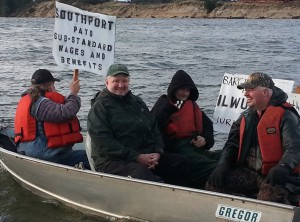
In Oregon, Local 12 Southport boat pickets: Local 12 members Leonard Nelson, John Huber, Bob Palmer & Steve Maine. Photo credit: ILWU.org
Due to a prolonged strike by dockworkers at ports on the West Coast, Honda is running short on parts it needs for plants in Ohio, Indiana and Canada. As a result, the Japanese maker is slowing down production rates at the plants in those places, the maker said.
“We are experiencing parts shortages at our auto operations in Ohio, Indiana and Canada that is impacting regular production,” Honda said in a statement.
Operations have been curtailed at plants in Greensburg, Indiana; Allison, Ontario; and Marysville and East Liberty, Ohio. Since January, Honda has using a combination of air cargo and special truck shipments to obtain key parts.
The plants in Ohio were closed Monday and will operate at only half speed for the balance of the week. Plants in Indiana and Ontario will also be closed for part of the week.
It’s a tough blow for Honda as those plants produce some of Honda’s big sellers: the Accord, the Civic compact and the CR-V compact SUV. Plants in Alabama, Georgia and Mexico are not impacted at this time, Honda said.
Honda’s Japanese competitors have also felt a pinch, but it hasn’t been as painful. Toyota cut overtime levels at some plants in North America. However, but it has increased production at the Tacoma pickup factory to minimize production disruptions.
Nissan said it has experienced “some impact” on parts shipments, but it relies heavily enough on local suppliers that the impact on U.S. operations will be “minimal.”
All three makers said they are shipping as many key parts as possible by air.
(Honda follows Toyota’s lead cutting global sales forecast. For more, Click Here.)
The West Coast ports in the United States have rocked by labor unrest for more than two years but the most serious dispute involves an impasse between the port operators represented by the Pacific Maritime Association (PMA) and the International Longshore and Warehouse Union (ILWU), which operates more than 115,000 workers at ports along the West Coast from San Diego north to Seattle-Tacoma.
(Click Here for details about Nissan’s 10% marketshare goal.)
The union’s contract expired in July and two sides are at odds over wages, pensions and concerns over the appointment of arbitrators. As a result of the strike, the ILWU free to honor picket lines of other unions, putting pressure on trucking companies that carry freight from the docks to inland railroad yards and warehouses.
(To see more about Infiniti’s new Q60 that could top 400 horsepower, Click Here.)
In mid-January, the PMA began reducing the hours of port operations in an effort to put pressure on ILWU by effectively cutting their income in response to what the association has described as a union-orchestrated slowdown. So far, the partial lockout has led to backlogs unloading and loading ships, leading to snarls all along the transpacific logistics chain.
The snarl are expected to get worse since many ships are now missing scheduled departure dates, while the dispute shows no sign of being resolved quickly. Government intervention is one possibility but the Obama administration has not indicated it is prepared to intervene like President Bush did during a 2003 strike and lockout.

This is a very good reason to produce all parts in the U.S.